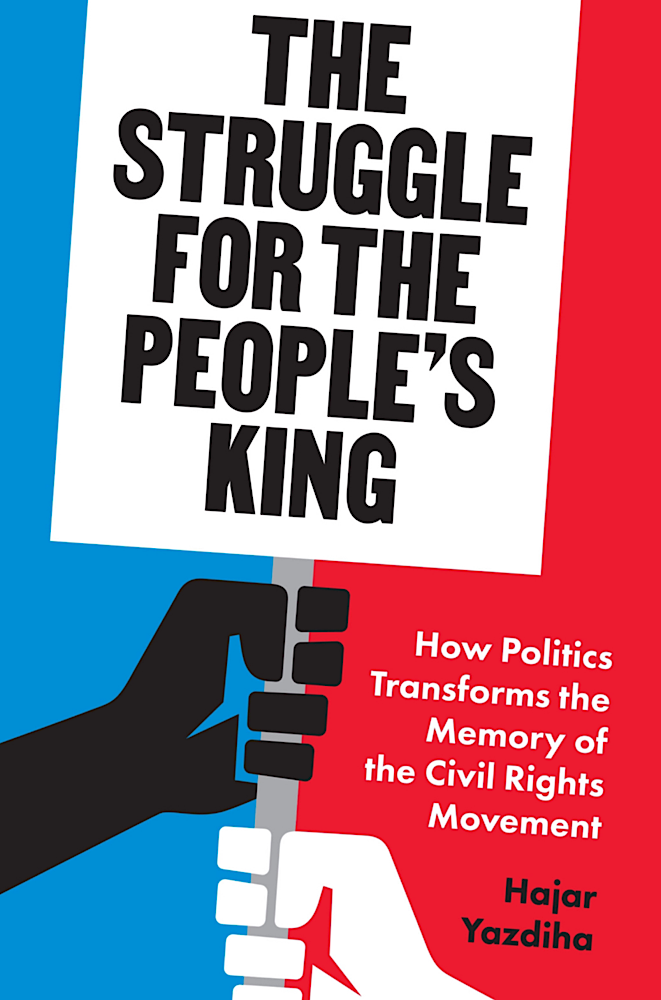Under the leadership of Martin Luther King Jr. the 1960s civil rights movement achieved far reaching legal and political changes. University of Southern California sociologist Hajar Yazdiha points out that not surprisingly a myriad of other disenfranchised and marginalized groups looked to the example and framed themselves as an extension of the work of King and the civil rights movement to advance their own goals and objectives. Less well studied, however, is how the inevitable conservative backlash, or “Whitelash,” that followed also tried to exploit the memory of King and the civil rights movement to roll back the progressive gains of the 1960s and the decades that followed. In The Struggle for the People’s King: How Politics Transforms the Memory of the Civil Rights Movement, Hajar Yazdiha argues that for the past several decades conservatives and progressives have been locked in a memory war with the present and future of the nation hanging in the balance.
Something strange happened when conservative megastar Glenn Beck and 80,0000 Tea Party supporters gathered at the steps of the Lincoln Memorial in Washington DC in August 2010. On the one hand, common conservative cultural themes of God and country, faith and patriotism were prominently on display. On the other hand, Beck made some surprising claims about the country’s civil rights past. Held on the 47th anniversary of the 1963 March on Washington in the very location where Dr. King gave his now iconic “I Have a Dream” speech, Beck argued that he and the Tea Party supporters were the true inheritors of King’s Dream. Perverted by the left, Beck argued that King was himself a conservative who would have been horrified by how radical left wing groups hijacked his memory for their own self-serving interests. “We are the people of the civil rights movement. We are the ones that must stand for civil and equal rights, justice, equal justice. Not special justice, not social justice. We are the inheritors and protectors of the civil rights movement. They are perverting it.”
Liberal media personalities like Stephen Colbert and Jon Stewart were quick to mock Beck’s manipulations of the past. The two comedians organized their own Rally to Restore Sanity and/or Fear that poked fun at the climate of fear mongering. Jon Stewert referred to Beck’s speech as the “I have scheme” speech. Yet Beck’s efforts to reframe the memory of Dr. King gained currency among conservatives. Many Christian conservatives in particular came to believe that they were living in an age of rampant special minority rights and privileges and were now at risk of becoming victims of reverse discrimination. Laying claim to the memory of Dr. King and the civil rights movement offered an appealing means of turning the tide and helping restore conservative values.
Laying claim to the memory of Dr. King was by no means an easy feat for conservatives. Outspoken about the problems of poverty and critical of the war in Vietnam, King was a controversial figure disliked and distrusted by the overwhelming majority white Americans at the time of his death. Although Congressman John Conyers (D-MI) called for a national holiday the day after King’s assassination, it took fifteen years before it was actually enacted. Critical of King and the civil rights movement, if then President Ronald Reagan decided to throw his support behind the King holiday, it was because other conservatives convinced him of the benefits of doing so. By making the memory of King official, conservatives could strip King of his radicalism and cast him as an exemplar of what Reagan Republicans were then arguing was the true American character and true source of American greatness—grit, determination, and individualism rather than reliance on the welfare state and big government. The official version of the memory of King also allowed conservative to declare King’s vision of a colorblind society to be a mission accomplished, providing the Reagan administration with a convenient smokescreen to roll back many of the protective measures from the civil rights era.
Remaking the collective memory of the civil rights movement and its symbolic figures for present-day political goals is not a mere rhetorical strategy. These recrafted memories tell a particular story about America’s racial history: its heroes and villains, whether racial inequality is a matter of the past or present, how much progress has been made and how far we have to go. These divergent stories about the past are consequential. They enable and constrain how groups imagine and pursue social change. Hajar Yazdiha, The Struggle for the People’s King: How Politics Transforms the Memory of the Civil Rights Movement
If we think about the memory of Martin Luther King Jr. and the civil rights movement as a memory tree, Yazdiha argues that it branches off in two main directions. The colorblind individualism branch stems from the Reagan era official memory in which King is cast as the embodiment of the character traits that Reagan Republicans claimed were the source of American greatness. This branch casts King’s aspiration to achieve a colorblind society as a mission accomplished, freeing the nation from a guilt laden and troubled past with all of its burdens and obligations. The second branch stems from the principal gatekeepers of the King memory—King’s wife, Coretta Scott King and extended family as well as participants in the civil rights movement. This is the unfinished dream branch which emphasizes how King’s goals and aspirations are far from complete and still a work in progress.
If we trace the collective memory of Martin Luther King Jr. and the civil rights movement from the Reagan to the Trump era, its two main branches overlap and grow in new and gnarled directions. What is most striking about these branches of memory is that they represent just about every conceivable organized group and movement on the political spectrum. From animal rights and anti-abortion activists to gun rights and nativists groups, the memory of MLK and the civil rights movement becomes a usable past for everyone. There are some key players whom Yazdiha labels as “the Kingmakers” who exercise an oversized influence on the growth and shape of this memory. These players are the “elite White class, state institutions, and media conglomerates” who often fuel the abuses and misuses of the past. In addition there are the mnemonic gatekeepers that include King’s family and civil rights movement participants who struggle to preserve the integrity and goals of MLK and the civil rights past.
Over time the two main progressive and conservative branches of the MLK/civil rights memory tree grow in more radical directions. On the right, the colorblind individualism memory branch moves in the “white Christian victimhood” direction. During the Clinton presidency, King is cast a conservative Christian who would have been aghast by the efforts of LGBTQ and other groups to twist the legacy of the civil rights movement for their own nefarious purposes. Similarly, anti-abortion activists could look to the civil rights past to claim that they were the new disadvantaged minority deserving of protection in an increasingly liberal and morally lax era. On the left, LGBTQ activists framed themselves as the inheritors of the civil rights movement. They too were the historic victims of intolerance, discrimination and violence. Just like King and the civil rights movement, they too were fighting for the full rights and benefits of citizenship.
Within a growing context of fear and intolerance fueled by the war on terror during the Bush administration both minorities and white conservatives wrestled over the uses of the past. Muslim Americans, who became one of the focal points of post 9/11 fears and hatred, stressed the unfinished legacy of the civil rights movement and the need to continue working to create a multicultural and colorblind society. On the right, nativists groups lashed out against Muslim Americans and other minorities whom they argued were perverting the aims of the civil rights movements by demanding special rights and privileges. A move in the direction of white nationalism became stronger with the creation of the Tea Party movement—a backlash against the Obama administration and the threat of white disenfranchisement.
Temperatures on all sides continued to rise during the Obama administration. On the left, longstanding concerns about systematic racism in the judicial system were fueled by national media attention given to police shootings of African Americans. Concerns about the need for police reform inspired the creation of the Black Lives Matter movement which drew from the radical legacy of the memory of MKL and the civil rights movement. On the right, fears of disenfranchisement became stronger as feelings of victimhood and nationalist sentiments became a source of white rage. Glenn Beck’s 2010 Rally to Restore Honor was part of the call to fight back, to reclaim the stolen legacy of the civil rights movement, and to save the nation from being distorted beyond recognition. A growing chorus of voices on the right called for an end to the system of racial entitlements with affirmative action in hiring and university admissions policies as the chief targets.
In an effort to cool temperature the media on both the right and the left drew from the santifized official memory of MLK to denounce the radicalism of the Black Lives Matter movement. From Fox News to CNN, media commentators recalled King’s use of non-violent forms of protest to denounce militant forms of protest in the present. By forgetting the memory of King’s radicalism, these media outlets argued that King would never have approved of the kinds of violent protest and confrontation unleashed by the Black Lives Matter movement. These supposed voices of moderation and civility, overlapping branches of the MLK/civil rights memory tree, recycled equally distorted and diluted versions of the past packaged for mass consumption.
By the time we reach the Trump presidency many conservatives were primed for an even more radical white supremacist manipulation of MLK and the civil rights past. The call to Make America Great Again functioned as a code for making America White and Christian Again. Not long after Trump’s inauguration, Yazdiha notes how the roll backs of civil rights measures began. “The rollbacks of civil rights began immediately with a series of executive orders that began limiting the rights of groups including Muslims, immigrants, prisoners, the disabled, and transgender Americans. The Trump administration’s cabinet appointees similarly pursued civil rights deregulation, from housing to health to education.” To prevent immigrant rights groups from tapping into the memory of MLK and the civil rights movement, the right stressed the theme of criminality and invasion. Efforts to find wedge issues, such as immigrants taking jobs that could otherwise go to American Americans, also served as a means of preventing or undercutting possible minority rights alliances.
Today social movements on the left need to contend with more than the precarity of civil rights gains, wedge issues or efforts to question the legitimacy of their claims to the civil rights past. From Muslim to women’s rights activists many of these movements have their own problematic and contentious histories with African Americans and the civil rights past. Building alliances and harnessing the moral authority and strategic resources of the past requires a willingness to confront their own history of suspicion, distrust, and unwillingness to share power. Moreover, building broader support will always be challenging within what Yazdiha describes as a culture of ignorance which fails to recognize the persistence of entrenched forms of systemic discrimination and exclusion.

Hajar Yazdiha
Hajar Yazdiha is Assistant Professor of Sociology at the University of Southern California and faculty affiliate of the USC Equity Research Institute and the Rutgers Center for Security, Race, and Rights. She is currently a 2024 Carnegie Fellow and a Global Scholar of the Canadian Institute for Advanced Research (2024-2025). She is the author of The Struggle for the People's King: How Politics Transforms the Memory of the Civil Rights Movement (2023).


